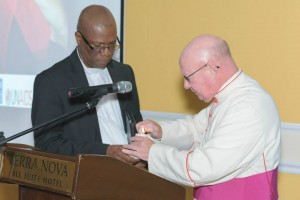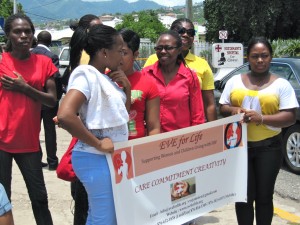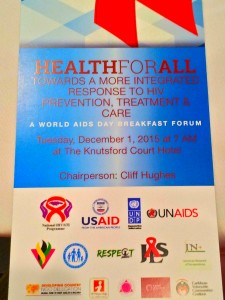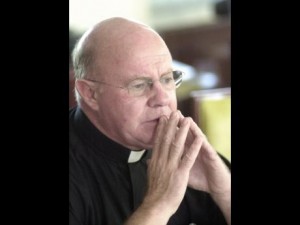
Msgr. Albert, HIV/AIDS and the Need to Recommit
December 1st, 2015
At breakfast today in a Kingston hotel, a large group of Jamaicans stood for a minute’s silence in remembrance of Msgr. “Father” Albert, who had passed away quite suddenly just the evening before. His presence seemed to hover among us for a few minutes; he was a regular participant in World AIDS Day ceremonies. Last year he started the breakfast off with an interfaith prayer, as he usually did. A kindly presence on occasions of celebration and of sorrow, Father Albert nevertheless reminded me of one of those uncles whom you never got to know very well. He was cheerful, yet distant at the same time. I think he was more “at home” in the inner city areas, getting on with organizing and charity work. Uptown hotels weren’t quite his cup of tea.

Msgr. Richard Albert lights a candle on World AIDS Day 2014. On such occasions, he always gave a thoughtful interfaith prayer. (My photo)
At this morning’s breakfast, Father Albert was described as someone who “always stood up for the marginalized in society.” This is well known, of course. Having arrived in Jamaica in the seventies from the Bronx, New York, the so-called “ghetto priest” set about establishing educational and training facilities in the poorest Kingston neighborhoods. As one resident put it on television this evening, “He was the poor people’s Prime Minister.” But he was not just a kind and generous priest; he was definitely of the “God helps those who help themselves” school of thought. He wanted to give people back their dignity, he said. Father Albert never excluded anyone. He cared about the homeless; the unemployed youth on the corner; HIV-positive men and women; the disabled (he established a home for lepers); the people of Riverton City, for example, and their children, where he founded a nursery school; and those who had suffered terrible injustices at the hands of the security forces.
The World AIDS Day breakfast was an ambitious program that would probably have been more suitable for a half-day session. It was organized by a remarkable coalition of government agencies, UN agencies, USAID and a collection of non-governmental organizations – a strong and united front, under the banner of HealthForAll. Someone noted that the early World AIDS Day commemorations had been primarily government events, while Jamaica AIDS Support for Life held its annual candlelight vigil quietly, on the front lawn of their office – an old-fashioned house that has been torn down to make way for more townhouses.
Today, the general mood was one of satisfaction at the progress that has been made over the years in the struggle with HIV/AIDS. All agreed, undoubtedly major strides had been made. Dr. Peter Figueroa, a pioneer and respected authority who had first spoken out on specific issues related to men who have sex with men (MSMs) and other marginalized populations, even managed a smile. Executive Director of Caribbean Vulnerable Communities Coalition (CVC) Dr. Carolyn Gomes said she was “thankful.”

Strong women: Eve for Life young mothers and their “Mentor Moms” at a march for children’s rights, just two years ago. (My photo)
And yet. And yet. There was a sense this morning that, while overall progress has been made, we have come right back to those Jamaicans whom Father Albert cared most about, those excluded Jamaicans; and to certain populations that we have lost track of, along the way. “Don’t forget the youth,” warned Tasheima Brown, a young HIV-positive mother with Eve for Life, in her introduction. Through successful outreach programs, HIV/AIDS rates among female commercial sex workers have fallen steadily, now down to around 2.9 per cent. But why not the same success with the LGBT community – especially those who have encountered “adverse life events,” as so many have? What about young men, who are having more multiple partners, and the young women and girls engaged in transactional sex? These behaviors are increasing. And why are we still talking about stigma and discrimination?
So, would Msgr. Albert have encouraged us to feel comfortable and complacent? As a fierce human rights defender (and founding member of Jamaicans for Justice) those two words did not apply to him. Nor should they apply to us.
To use a word I heard more than once today: It’s time to “recommit.” We still have a way to go.
Tags: Caribbean Vulnerable Communities Coalition, Carolyn Gomes, children's rights, commercial sex workers, disabled, Eve for Life, Father Albert, health, Health For All, HIV/AIDS, homeless, human rights, J-FLAG, Jamaica AIDS Support for Life, Kingston, LGBT community, Monsignor Richard Albert, MSM, New York, NGO, Peter Figueroa, Riverton City, stigma and discrimination, transactional sex, U.S. Embassy, unemployment, USAID, World AIDS Day
The Gleaner reserves the right not to publish comments that may be deemed libelous, derogatory or indecent.
To respond to The Gleaner please use the feedback form.
- We Are the Zoomers
- Living Online with Humans and Birds: NAOC 2020
- Human Trafficking and the Problem of Public Education
- Down Memory Lane
- Are We Ready to Recover from COVID-19?
- Road Safety Matters: Is Your Vehicle Safe?
- Sexual Harassment, Me Too, and the Minister’s Disturbing Giggle
- The Vulnerable Senior Citizens, Private Care Homes and COVID-19
- A Muddle Over Masks
- Here is Something Life-Saving You Can Do: Give Blood!




